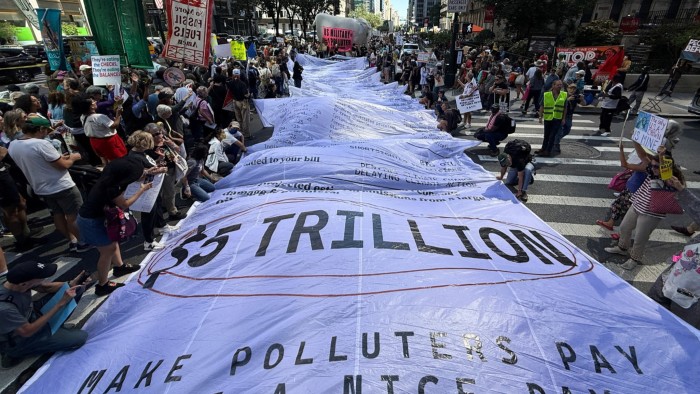Unlock the White House Watch newsletter for free
Your guide to what Trump’s second term means for Washington, business and the world
US climate leaders are reframing their focus on power costs to counter attacks by Donald Trump’s administration, shifting the tactics behind a continued push into green energy.
Business leaders, government officials and civil society groups gathered this week in New York for the first climate week on the sidelines of the UN General Assembly since the re-election of President Trump, who chose the occasion to slam climate change as a “the greatest con job ever”.
But climate-focused non-profit organisations, political advocates and corporate sustainability executives focused on a weak spot for the Trump administration: record high energy costs.
Manish Bapna, chief executive of the Natural Resources Defense Council, said the removal of clean energy incentives which were put in place in the Joe Biden era would result in higher electricity prices. “I believe the American public and the political system will respond,” he added.
“The cleanest solutions are the most affordable solutions and that has huge pocketbook benefits for people’s lives,” said Vickie Patton general counsel at the Environmental Defense Fund. “There will be progress on climate because of the fundamentals.”
Some Democratic politicians said their party had struggled to communicate to voters that the Inflation Reduction Act, the Biden administration’s landmark climate policy, would improve the job market and the broader economy. By contrast, Trump and his energy secretary, Chris Wright, have repeatedly blamed renewable sources for high energy costs.
Former energy secretary Jennifer Granholm said she expected the messaging from politicians would shift and fewer would mention the climate as a subject.
“People see that as sort of a nice-to-have, not a must have,” she said. “Affordability is key.”
Fossil fuel executives have also sought to capitalise on the affordability issue, particularly for the support of projects in states with high electricity prices.
Toby Rice, chief executive of gas producer EQT, said: “This environmental movement has been a bit of a free lunch, people have not seen the impacts of what happens when you cancel pipelines, but we’re seeing it right now. Energy costs to consumers are up.”
Some Democratic politicians are weighing their options. New York governor Kathy Hochul is re-evaluating the North Eastern Supply and Constitution pipelines, both halted following environmental concerns, as a potential way to improve energy affordability.
Chris Treanor, executive director of Page, a coalition of US liquefied natural gas producers, said: “There’s been a recognition that maybe the ideology of opposing natural gas pipelines doesn’t solve the problems that they believe that they did.”
The shift in positioning has permeated the business world. Clean energy start-ups said they were widening their pitch when fundraising and signing deals.
Thomas Sisto, chief executive of XL Batteries, said: “I would say the era of the ‘green premium’ is dead . . . we don’t shy away from saying that the best use of our tech is for wind and solar — but we’re also targeting data centres and the oil and gas industry.”
Despite setbacks in the US and broader geopolitical pressures which have given a boost to anti-green sentiment in some countries, many other country leaders expressed their commitment to the transition away from fossil fuels.
More than 100 countries have submitted updated climate plans to the UN ahead of the next summit in Brazil in November, although heavy emitters such as India remain outstanding and some plans have been described as “underwhelming” for not going far enough to address climate change.
China’s President Xi Jinping urged the international community to stay focused on the “right direction” in his address to the UN, and Brazil’s President Luiz Inácio Lula da Silva called on countries to strengthen their emissions reductions plans ahead of COP30.
“We have massively invested in renewable energy,” said European Commission president Ursula von der Leyen at a Climate Week event. “We knew this was not only good for the climate, but because renewables are the most secure, plentiful, stable option in the long term.”
Climate Capital

Where climate change meets business, markets and politics. Explore the FT’s coverage here.
Are you curious about the FT’s environmental sustainability commitments? Find out more about our science-based targets here

